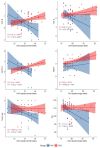The Effect of CAG Repeats within the Non-Pathological Range in the HTT Gene on Cognitive Functions in Patients with Subjective Cognitive Decline and Mild Cognitive Impairment
- PMID: 34200421
- PMCID: PMC8228729
- DOI: 10.3390/diagnostics11061051
The Effect of CAG Repeats within the Non-Pathological Range in the HTT Gene on Cognitive Functions in Patients with Subjective Cognitive Decline and Mild Cognitive Impairment
Abstract
The Huntingtin gene (HTT) is within a class of genes containing a key region of CAG repeats. When expanded beyond 39 repeats, Huntington disease (HD) develops. Individuals with less than 35 repeats are not associated with HD. Increasing evidence has suggested that CAG repeats play a role in modulating brain development and brain function. However, very few studies have investigated the effect of CAG repeats in the non-pathological range on cognitive performances in non-demented individuals. In this study, we aimed to test how CAG repeats' length influences neuropsychological scores in patients with subjective cognitive decline (SCD) and mild cognitive impairment (MCI). We included 75 patients (46 SCD and 29 MCI). All patients underwent an extensive neuropsychological battery and analysis of HTT alleles to quantify the number of CAG repeats. Results: CAG repeat number was positively correlated with scores of tests assessing for executive function, visual-spatial ability, and memory in SCD patients, while in MCI patients, it was inversely correlated with scores of visual-spatial ability and premorbid intelligence. When we performed a multiple regression analysis, we found that these relationships still remained, also when adjusting for possible confounding factors. Interestingly, logarithmic models better described the associations between CAG repeats and neuropsychological scores. CAG repeats in the HTT gene within the non-pathological range influenced neuropsychological performances depending on global cognitive status. The logarithmic model suggested that the positive effect of CAG repeats in SCD patients decreases as the number of repeats grows.
Keywords: APOE; BDNF; CAG repeats; Huntington’s gene; cognitive functions; intermediate alleles; mild cognitive impairment; subjective cognitive decline.
Conflict of interest statement
The authors declare no conflict of interest.
Figures


Similar articles
-
CAG Repeats Within the Non-pathological Range in the HTT Gene Influence Personality Traits in Patients With Subjective Cognitive Decline: A 13-Year Follow-Up Study.Front Psychiatry. 2022 Mar 11;13:826135. doi: 10.3389/fpsyt.2022.826135. eCollection 2022. Front Psychiatry. 2022. PMID: 35370826 Free PMC article.
-
Huntingtin gene intermediate alleles influence the progression from subjective cognitive decline to mild cognitive impairment: A 14-year follow-up study.Eur J Neurol. 2022 Jun;29(6):1600-1609. doi: 10.1111/ene.15291. Epub 2022 Feb 28. Eur J Neurol. 2022. PMID: 35181957
-
Investigation of the Influence of TBP CAG/CAA Repeats in Conjunction with HTT CAG Repeats on Huntington's Disease Age at Onset in a Brazilian Sample.J Mol Neurosci. 2022 May;72(5):1116-1124. doi: 10.1007/s12031-021-01938-z. Epub 2022 Mar 11. J Mol Neurosci. 2022. PMID: 35275350
-
Multiple clinical features of Huntington's disease correlate with mutant HTT gene CAG repeat lengths and neurodegeneration.J Neurol. 2019 Mar;266(3):551-564. doi: 10.1007/s00415-018-8940-6. Epub 2018 Jun 28. J Neurol. 2019. PMID: 29956026 Review.
-
Exploring the correlates of intermediate CAG repeats in Huntington disease.Postgrad Med. 2011 Sep;123(5):116-21. doi: 10.3810/pgm.2011.09.2466. Postgrad Med. 2011. PMID: 21904093 Review.
Cited by
-
The HTT gene influences plasma neurofilament light chain and brain metabolism in prodromal Alzheimer's disease.J Neurol. 2025 Aug 22;272(9):588. doi: 10.1007/s00415-025-13312-9. J Neurol. 2025. PMID: 40844528
-
Mild cognitive impairment in Huntington's disease: challenges and outlooks.J Neural Transm (Vienna). 2024 Apr;131(4):289-304. doi: 10.1007/s00702-024-02744-8. Epub 2024 Jan 24. J Neural Transm (Vienna). 2024. PMID: 38265518 Review.
-
CAG Repeats Within the Non-pathological Range in the HTT Gene Influence Personality Traits in Patients With Subjective Cognitive Decline: A 13-Year Follow-Up Study.Front Psychiatry. 2022 Mar 11;13:826135. doi: 10.3389/fpsyt.2022.826135. eCollection 2022. Front Psychiatry. 2022. PMID: 35370826 Free PMC article.
References
-
- Jessen F., Amariglio R.E., van Boxtel M., Breteler M., Ceccaldi M., Chételat G., Dubois B., Dufouil C., Ellis K.A., van der Flier W.M., et al. A Conceptual Framework for Research on Subjective Cognitive Decline in Preclinical Alzheimer’s Disease. Alzheimer’s Dement. J. Alzheimer’s Assoc. 2014;10:844–852. doi: 10.1016/j.jalz.2014.01.001. - DOI - PMC - PubMed
-
- Albert M.S., DeKosky S.T., Dickson D., Dubois B., Feldman H.H., Fox N.C., Gamst A., Holtzman D.M., Jagust W.J., Petersen R.C., et al. The Diagnosis of Mild Cognitive Impairment Due to Alzheimer’s Disease: Recommendations from the National Institute on Aging-Alzheimer’s Association Workgroups on Diagnostic Guidelines for Alzheimer’s Disease. Alzheimers Dement. 2011;7:270–279. doi: 10.1016/j.jalz.2011.03.008. - DOI - PMC - PubMed
-
- Mazzeo S., Bessi V., Padiglioni S., Bagnoli S., Bracco L., Sorbi S., Nacmias B. KIBRA T Allele Influences Memory Performance and Progression of Cognitive Decline: A 7-Year Follow-up Study in Subjective Cognitive Decline and Mild Cognitive Impairment. Neurol. Sci. 2019;40:1559–1566. doi: 10.1007/s10072-019-03866-8. - DOI - PubMed
Grants and funding
LinkOut - more resources
Full Text Sources
Miscellaneous

